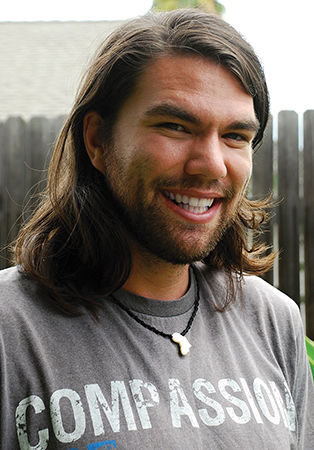The documentary “When the Saints” may seem, at first, an in-depth examination of the human trafficking trade. But at its heart, the film is an intimate personal journey that reveals powerful spiritual truths for producer David Peterka and his fellow filmmakers.
“This experience is not at all what I expected,” says the Missouri native about the years-long research and filming he did in the Southeast African country of Malawi. “When Jesus asks us to follow him, I may think I can earn his approval or love, but the reality is I will fail, and I will turn to Jesus and say, ‘I can’t do this. I need you to come alive inside of me.’ Because that’s where he wants to be so desperately with us.”
Peterka, an outreach director at his local Christian church in St. Louis, was recently in Los Angeles, screening the documentary to 32 cities across the country this summer. The film — which is almost complete — has been shown at local Christian churches and private homes with positive audience response.
The film depicts the calling Peterka had to end sexual exploitation and forced prostitution of young girls, as well as his journey to help create the first ever safe home in Malawi. In addition, the film touches on the ways that society worldwide fuels human trafficking and sexual exploitation. “That is where it all begins,” says Peterka. “With us.”
Connecting the dots from St. Louis to the Malawi district of Dowa was indeed an intricate puzzle. Though only in his mid-20s, Peterka has extensively traveled aboard and has done missionary work in orphanages, churches and communities in Kenya, Mexico and India. In 2009, he and filming partners traveled across Europe and through six Eastern African countries, living on $1.25 a day for food and water which was recorded in the documentary “What Matters?”
Peterka had “an epiphany” after a 21-day fast to reach out to young girls being exploited and says the connection to Malawi resulted from “too many coincidences.”
“This is where Jesus was leading me,” he says. The result was perfect timing because, once in the country, he was introduced to citizens who were trying to buy and create a safe home to support and rehabilitate victims.
That safe home is currently being constructed and is set to be completed in early December. Peterka plans to return with his crew to film the first girls to use the safe home as the ending to the documentary. A simulcast of the completed documentary is scheduled in early December on the website, www.whenthesaints.com.
While the statistics are startling — 2.4 million people are trafficked worldwide and 17,500 into the U.S. every year — the heart of the matter is people’s hearts, says Peterka. His next project will be ministering to men and to raise awareness on how every day we are exploiting others around us — and might not even know it.
“It’s one thing to defend and rescue those who have been victims, but we need to look at how the cycle starts and it’s with our attitudes and actions,” he says. “We need to see how we are hurting others.”
Peterka admits that in his younger days he would look at pornography and behave inappropriately, which he now realizes is “using” others for his own personal satisfaction. “Jesus was the one who freed me,” he explains.
Peterka looks forward to the next steps in not only the documentary’s life, but his own. “I don’t want to be on a pedestal, but I want to do the work that Jesus asks me to do,” he says adding that he challenges all churches to respond with care, action and compassion to sexual victims and perpetrators. “We must love them all.”

